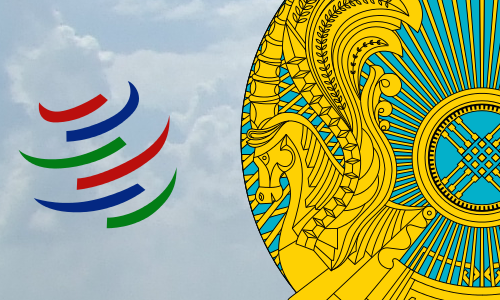Iran and the SCO: new opportunities, new challenges
By Richard Weitz (05/08/2015 issue of the CACI Analyst)
Now that the UN Security Council has blessed the Iranian nuclear deal, Tehran’s chances of becoming a full member of the Shanghai Cooperation Organization (SCO) in coming years have improved, following a decade of rejection. Iranian leaders have long wanted to join the SCO to gain diplomatic, economic, and security advantages. Nonetheless, Iran will need to overcome several major obstacles on its path to full membership, even if nothing goes amiss with the implementation of its nuclear deal.
Kazakhstan Completes WTO Negotiations
By Nurzhan Zhambekov (06/24/2015 issue of the CACI Analyst)
Kazakhstan completed its accession negotiations with the World Trade Organization (WTO) on June 10 and will join the WTO later in 2015. This is a milestone in Kazakhstan’s economic development. The WTO’s member states voted in favor of Kazakhstan’s accession at a meeting in Geneva on June 22, 2015. Whereas the economic impact is currently difficult to assess, the reduction in trade tariffs should in theory improve the competitiveness of Kazakhstan’s economy, leading to higher economic growth. In practice, Kazakhstan’s experience within the Eurasian Economic Union (EEU) has not been positive, as Kazakh producers have struggled to compete with larger Russian companies. Kazakh consumers are likely to benefit from Kazakhstan’s upcoming membership in the WTO, while Kazakh producers will face increasing international competition.

CACI Analyst, June 24, 2015
Contents
Analytical Articles
EXISTING PARADIGMS FOR RESISTANCE IN THE NORTH CAUCASUS CHALLENGED BY KADYROV, ISIS, by Kevin Daniel Leahy
FOOTBALL NATIONALISM AMONG IRAN’S AZERIS, by Emil Souleimanov
KAZAKHSTAN COMPLETES WTO ACCESSION NEGOTIATIONS, by Nurzhan Zhambekov
AZERBAIJAN AND THE EU, by Natalia Konarzewska
Field Reports
RUSSIA ENHANCES ITS SOFT POWER IN GEORGIA THROUGH LOCAL NGOs, by Eka Janashia
BISHKEK AND TASHKENT FACE UNEASY RELATIONS, by Arslan Sabyrbekov
TAJIKISTAN’S ISLAMIC RESISTANCE PARTY STRUGGLES TO SURVIVE, by Oleg Salimov
ARMENIA AND IRAN HOLD POLITICAL CONSULTATIONS, by Erik Davtyan
CACI Analyst, June 10, 2015
Contents
Analytical Articles
HANGING IN THE TRADE BALANCE: IS FREE TRADE A CURSE FOR KAZAKHSTAN?, by Sergei Gretsky
SHIFTING RUSSIAN POLICIES TOWARDS ALLIED SEPARATIST REGIONS, by Michael Hikari Cecire
AFGHANISTAN-PAKISTAN INTELLIGENCE COOPERATION AND THE PROSPECT OF PEACE, by Sudha Ramachandran
TURKEY-ARMENIA RELATIONS AFTER TURKEY'S ELECTIONS, by Armen Grigoryan
Field Reports
GEORGIA'S POLITICAL LANDSCAPE TRANSFORMS AS SENIOR UNM MEMBERS DEFECT, by Eka Janashia
KYRGYZ PARLIAMENT PASSES "FOREIGN AGENTS" LAW IN FIRST READING, by Arslan Sabyrbekov
AZERBAIJANI DIPLOMAT UNDER ATTACK AFTER COMMENTING BAKU FIRE, by Mina Muradova
THE RIGA SUMMIT AND NEW PROSPECTS FOR EU-ARMENIA RELATIONS, by Erik Davtyan
CACI Analyst, May 27, 2015
Contents
Analytical Articles
THE SOUTHERN ENERGY CORRIDOR: A STRATEGIC PRIORITY FOR THE U.S.?, by Mamuka Tsereteli
ELECTION YEAR IN THE EURASIAN UNION AND THE EU'S EXTERNAL ACTION POLICIES, by Gaël Chataignère
MOSCOW STEPS UP PRESSURE ON CHECHNYA'S POWERFUL RULER, by Valeriy Dzutsev
THE CHALLENGES TO GEORGIA'S ENERGY SECTOR, by Ariela Shapiro
Field Reports
INGUSHETIA'S LEADER CLAIMS THE END OF INSURGENCY IN HIS REPUBLIC, by Huseyn Aliyev
GEORGIA FAILS TO OBTAIN VISA-FREE REGIME AT EaP RIGA SUMMIT, by Eka Janashia
ARMENIA'S AND GEORGIA'S PRIME MINISTERS IRON OUT RECENT STRAINS IN BILATERAL RELATIONS, byErik Davtyan
PARTY RESTRUCTURING IN KYRGYZSTAN PRIOR TO 2015 ELECTIONS, by Arslan Sabyrbekov




